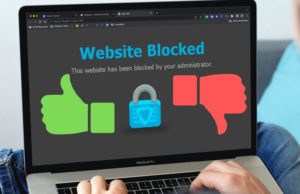CON:
May 16, 2022
Throughout the years, schools have upped their computer usage drastically for learning; this has increased the use of web filters. Many students feel different ways about these filters, which ultimately leads us to the big question: do these web filters actually hurt students more than they benefit them?
Web filters restrict and control what websites a user can view on the internet. School-issued Chromebooks and desktops at schools have web filters installed. These web filters are designed to restrict students from accessing inappropriate content and curb students from playing games or consuming entertainment during instructional time. They can be seen as something beneficial for students, however, filtering poses no true benefits for students.
Web filtering does not teach students how to browse the web, in fact, it does the opposite. Once a student goes home or uses their phone, they can interact and access whatever they want. Therefore, by using a web filter, a student becomes a naive internet user as they have not properly learned how to browse the web and developed digital literacy skills.
Web filtering many times has blocked my friends and I from accessing information needed for research. Blocking websites that are needed to complete assignments hurts one’s learning. Students at a financial disadvantage are hurt even more by this; if school internet is the only way to access the web and they can not get the info they need, which can be detrimental to completing assignments.
Using a web filter comes at a cost, the money budgeted for web filtering could be allocated to more worthwhile expenses. While the exact cost of web filtering is unknown, we can assume it comes at a hefty price. According to MCPS in the fall of 2020, there were 160,564 students enrolled in school, these are all students who have web filters installed, which is very expensive.
Web filters allow teachers and staff to monitor what students are doing on their devices without their consent, which can be considered an invasion of privacy. If web filters truly worked, teacher supervision should not be necessary.
A student can go on their phone or simply not do their work so using a web filter to help curb this is redundant.
In the end having a web filter on school-distributed Chromebooks is limiting students’ ability to engage in authentic digital learning.




